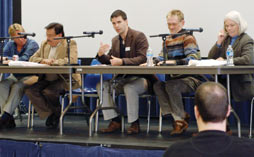By Martina Treviño/reporter

Moving from an intimate conference room to a large classroom and ending in a vast meeting room, the NW Campus AIDS Awareness Day audience spread and grew like the virus the event highlighted.
The day began with NW students videotaping interviews with people living with HIV/AIDS and representatives of various AIDS agencies and ended with a five-person panel discussion.
James, 38, who was infected at 18 and has been HIV-positive since 1989, spoke publicly on his HIV status for the first time and asked that his last name not be used. James said his initial reaction to his diagnosis was, “Why me?”
“The person who gave it to me knew they had it and did not tell me,” he said.
James said he has since sought to have the person brought up on criminal charges. But James said he lives a normal life.
“I don’t let it slow me down,” he said. “I still have fun and enjoy going to the movies and going to church.”
James said he is in a romantic relationship with a person who is also HIV-positive. However, their mutual status does not allow them to have unprotected sex because since there are various strains of the virus, they could still endanger each other.
However, James said he has to make adjustments in his life to allow for a medication schedule that includes injecting himself twice daily and making certain that the needles he uses are disposed of properly.
He can work only a limited number of hours or he will lose the government benefits he receives.
Joe Brown, professor of theater arts and director of freshmen studies at Texas Wesleyan University, spoke to students in a classroom setting about how his HIV-positive status has affected his life.
Brown said he believed he was in a monogamous homosexual relationship until his partner told him that he had been having unprotected sex with other men for several months and that Brown should be tested.
Brown has been HIV-positive for more than 25 years. For the last 24 years, he has lived in a monogamous relationship with the same man. His partner remains HIV-negative, he said.
Brown is required to take more than 40 pills a day and takes some medicines to counteract the effects, such as higher cholesterol and high blood pressure, of the medications that fight HIV. The annual cost for his medication is $32,000.
Unlike James and many others living with AIDS, Brown has private health insurance, yet his annual out-of-pocket expense is still $2,100 for his medications.
“How do I live?” Brown asked.
“I teach at TWU, where it is not a secret. They are like a supportive family,” he said. “I eat right. I watch my weight. I exercise. I am a fighter.”
Brown also attributes his well being to his partner and to his pets.
“I am a believer in pet therapy,” he said.
After breaking for lunch, the event continued with a multimedia presentation by Brown in the WSTU meeting room. He began by quizzing the audience on facts about HIV/AIDS, starting with the name.
“Acquired Immune Deficiency Syndrome—you acquire it through bodily fluids, semen, blood or urine,” he said.
HIV/AIDS can be transmitted through unprotected sex, shared needles used for drugs (including those used for steroids) and even improperly sterilized tattoo or piercing instruments, he said.
Brown said 47 million people carry the virus worldwide. The demographic group in which AIDS is rising fastest in the United States is college-age heterosexuals, especially Latino and African-American females, Brown said.
“Ladies, just because you are monogamous does not mean he is,” he said.
To demonstrate how easily sexually transmitted infections could be passed, Brown asked seven students to volunteer and gave them stereotypical roles.
“Sandra the slut, Virginia the virgin, Patrick the party animal, Terry the athletic trainer, Innocent Irma, Joe the stud and Big Rocky the athlete” were used to show how the virus could be transmitted from one to another. Using a Whatchamacalit candy bar to represent the virus, Brown illustrated how through unprotected sex, needle sharing, date rape and accidental contact, an STI reached every one of them.
“ It is your choice to get tested,” he said, “If you have it, you learn to live with it, and you’ll probably live a healthier life for it. It is not a death sentence.”
Brown’s presentation was followed by a panel discussion that included Brown, Sue Mahoney, housing specialist/volunteer coordinator for Samaritan House; Ted Lovato, vice president and chief operations officer for Samaritan House; Derek Robertson, associate executive director of AIDS Outreach Center of Greater Tarrant County, and Memie Hardie, an AIDS education specialist with Health Education Learning Project.
The panel stressed the importance of AIDS education.
“Knowledge is power,” Brown said, “Google ‘safe-sex’ if you have to.”
Hardie said the only way to know if someone is HIV-positive is to be tested. The general symptoms are fever, night sweats, swollen lymph nodes and occasionally thrush. These symptoms usually occur mid-stage and many people go eight to 10 years without knowing they have the virus, she said.
Robertson said that in one year three of his clients discovered that they were HIV-positive when they found out they were pregnant. They thought they were in monogamous relationships. One was, but her partner used steroids, he said.
“You cannot tell by looking,” he said; “95 percent of our clients do not look sick.”
Although Lovato said abstinence is the best defense against HIV, the panel encouraged the use of condoms.
“Use condom sense,” Brown said.
Robertson said, “Condoms break about 2 percent of the time. Vows of abstinence break a lot more often than condoms.”
In addition, the panelists stressed routine testing.
“Be assertive in your health care,” Robertson said, “making testing a normal part of your healthcare routine.”
Mahoney said, “If you are afraid, get a friend to go with you.”
Brown said testing should be the start of a relationship.
“When you begin a long-term monogamous relationship, get tested first. Go with your partner,” he said, “Have a date to get tested.”
Robertson said it is vital for pregnant women to know their HIV status because even if they are HIV-positive, with early treatment, 99 percent of babies can be born free from the virus.
The day’s activities were the collective efforts of five NW Campus classes—Christine Hubbard’s English, Linda Quinn’s humanities and Bobbi Stringer’s speech—and will result in the More Life Project film Voices.
The film will be shown during the Fort Worth More Life Festival May 10-June 7 at the Fort Worth Community Arts Center. The community event is designed to educate the public and reduce the stigma associated with HIV/AIDS.
Free, confidential HIV screening will be available on NW Campus, March 5 and April 9, in WTLO 4104, 10 a.m.–2 p.m. To schedule an appointment or for additional information, contact NW health services at 817-515-7790.




























